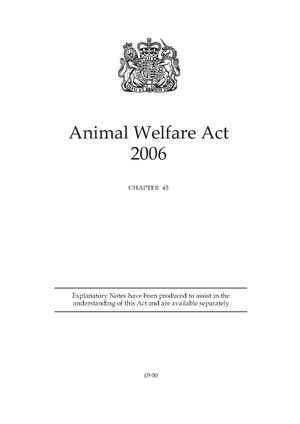Animal Welfare Act 2006: Difference between revisions
No edit summary |
No edit summary |
||
| (4 intermediate revisions by 2 users not shown) | |||
| Line 1: | Line 1: | ||
The Animal Welfare Act 2006 is | [[Category:Animal law]] | ||
[[Category:United Kingdom]] | |||
[[File:Animal Welfare Act 2006.pdf|alt=Animal Welfare Act 2006|thumb|'''Animal Welfare Act 2006''']] | |||
The '''Animal Welfare Act 2006''' is the principal law in England and Wales that relates to animal welfare.<ref>[https://www.gov.uk/guidance/animal-welfare#:~:text=The%20Animal%20Welfare%20Act%202006%20is%20the%20principal%20law%20relating%20to%20animal%20welfare%2C%20protecting%20all%20vertebrate%20animals. Guidance Animal welfare] gov.uk</ref> It was introduced to promote the welfare of vertebrate animals, excluding those in the wild.<ref>[https://www.legislation.gov.uk/ukpga/2006/45/crossheading/introductory#:~:text=it%20is%20not%20living%20in%20a%20wild%20state. Animal Welfare Act 2006] legislation.gov.uk</ref> The Act is significant as it introduced a new concept for pet owners and those responsible for domestic animals, such as breeders and those who have working or farm animals.<ref name=":0">[https://www.rspca.org.uk/whatwedo/endcruelty/changingthelaw/whatwechanged/animalwelfareact Animal Welfare Act] RSPCA</ref> | |||
The | The Act places a duty of care on people to ensure they take reasonable steps to meet the welfare needs of their animals to the extent required by good practice.<ref name=":0" /> This means that they must provide for the [[Five Freedoms|five welfare needs of the animals]], which are: | ||
# Need for a suitable environment | |||
# Need for a suitable diet | |||
# Need to be able to exhibit normal behaviour patterns | |||
# Need to be housed with, or apart, from other animals | |||
# Need to be protected from pain, suffering, injury and disease | |||
The act | The Act allows enforcement agencies and inspectors to act by advising and educating owners before their pets suffer.<ref name=":0" /> If this advice is not followed or the animal’s needs are not being met, then action can be taken, whether through a formal warning or in some cases a prosecution.<ref name=":0" /> | ||
== See also == | |||
* Newshound: [https://wikianimal.org/news/p/i/?a=normal&get=f_70 Animal Welfare Act 2006] | |||
* Animal Hub: [https://wikianimal.org/hub/s/animal-law/ Animal Law] | |||
==External links== | |||
* [https://www.legislation.gov.uk/ukpga/2006/45/contents Animal Welfare Act 2006] GOV.UK | |||
* [https://web.archive.org/web/20221223112131/https://www.animallaw.info/article/overview-uk-animal-protection-legislation#:~:text=The%20primary%20legislation%20pertaining%20to%20the%20protection%20of,%28Northern%20Ireland%29%202011%20Animals%20Protected%20Under%20the%20Legislation Overview of UK Animal Protection Legislation] Michigan State University College of Law | |||
== References == | |||
== | <references /> | ||
[[Category:Animal law in the United Kingdom]] | [[Category:Animal law in the United Kingdom]] | ||
Latest revision as of 11:22, 28 November 2023

The Animal Welfare Act 2006 is the principal law in England and Wales that relates to animal welfare.[1] It was introduced to promote the welfare of vertebrate animals, excluding those in the wild.[2] The Act is significant as it introduced a new concept for pet owners and those responsible for domestic animals, such as breeders and those who have working or farm animals.[3]
The Act places a duty of care on people to ensure they take reasonable steps to meet the welfare needs of their animals to the extent required by good practice.[3] This means that they must provide for the five welfare needs of the animals, which are:
- Need for a suitable environment
- Need for a suitable diet
- Need to be able to exhibit normal behaviour patterns
- Need to be housed with, or apart, from other animals
- Need to be protected from pain, suffering, injury and disease
The Act allows enforcement agencies and inspectors to act by advising and educating owners before their pets suffer.[3] If this advice is not followed or the animal’s needs are not being met, then action can be taken, whether through a formal warning or in some cases a prosecution.[3]
See also
- Newshound: Animal Welfare Act 2006
- Animal Hub: Animal Law
External links
- Animal Welfare Act 2006 GOV.UK
- Overview of UK Animal Protection Legislation Michigan State University College of Law
References
- ↑ Guidance Animal welfare gov.uk
- ↑ Animal Welfare Act 2006 legislation.gov.uk
- ↑ 3.0 3.1 3.2 3.3 Animal Welfare Act RSPCA
